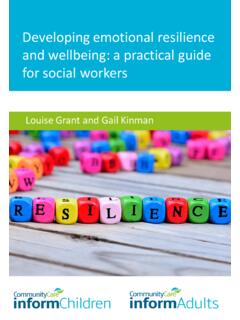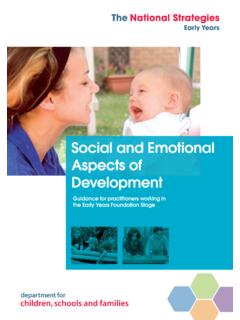Transcription of BEHAVIOURAL, EMOTIONAL AND SOCIAL DEVELOPMENT …
1 1 Crown copyright 2012 behavioural , EMOTIONAL AND SOCIAL DEVELOPMENT UNIT 10 TEACHING SOCIAL AND EMOTIONAL SKILLS LEARNING OBJECTIVES Teachers will: Have a broad understanding of EMOTIONAL competencies and SOCIAL and EMOTIONAL skills Have a broad understanding of The SOCIAL and EMOTIONAL Aspects of Learning (SEAL) programme and other initiatives that can help promote the SOCIAL and EMOTIONAL DEVELOPMENT of pupils with BESD needs Have a clear understanding of what interventions are available in your school to promote the SOCIAL and EMOTIONAL skills of pupils and any gaps that exist.
2 ONLINE RESOURCES The content and tasks throughout these PDFs are supported by online resources that are designed to facilitate and supplement your training experience. Links to these are signposted where appropriate. The resources use graphics and interactive elements to: Highlight salient points Provide at-a-glance content summaries Introduce further points of interest Offer visual context Break down and clearly present the different stages and elements of processes, tasks, practices, and theories The online resources offer great benefits, both for concurrent use alongside the PDFs, or as post-reading revision and planning aids.
3 Please note that the resources cannot be used in isolation without referencing the PDFs. Their purpose is to complement and support your training process, rather than lead it. You should complete any learning or teaching tasks and additional reading detailed in this PDF to make full use of the Advanced training materials for autism; dyslexia; speech, language and communication; EMOTIONAL , SOCIAL and behavioural difficulties; moderate learning difficulties. To find out more about the resources, how they work, and how they can enhance your training, visit the homepage at: 2 Crown copyright 2012 The first resource for this unit can be found here: BRIEFING SOCIAL DEVELOPMENT refers to the increasing ability to relate to others and to become independent, while EMOTIONAL DEVELOPMENT is the increasing ability to feel and to express a growing range of emotions.
4 Children and young people s SOCIAL and EMOTIONAL DEVELOPMENT is crucial for positive SOCIAL functioning and success in education and adult life. This is particularly important for those with BESD needs as they often have significant difficulties in these areas. Goleman1 (1996) identified five EMOTIONAL competencies, crucial to SOCIAL and EMOTIONAL DEVELOPMENT : Awareness of self and others understanding feelings and their impact on self and others Mood management managing difficult feelings and controlling impulses and anger Self-motivation the ability to set goals and persevere towards them in spite of difficulties and setbacks Empathy being able to understand from the perspective of others, both cognitively and affectively Management of relationships the ability to make friends, resolve conflicts and co-operate with others.
5 Elias et al2 (1999) assert that many of the problems in our schools are the result of EMOTIONAL malfunction and debilitation from which too many children suffer. They also suggest that EMOTIONAL well-being is dramatically and positively predictive not only of academic achievement, but also of satisfactory and productive experiences in the world of work. Given the immense potential of EMOTIONAL intelligence to contribute to academic achievement and economic wellbeing, it is hardly surprising to see a growing interest in this area within the field of education.
6 1 Goleman, D. (1996). EMOTIONAL intelligence: why it can matter more than IQ. Bantam Books. New York 2 Elias, M., Tobias, S. and Friedlander, B. (1999) Emotionally intelligent parenting: How to raise a self-disciplined, responsible, socially-skilled child. Three Rivers Press. New York 3 Crown copyright 2012 The introduction of the national SOCIAL and EMOTIONAL Aspects of Learning (SEAL) programme, first in primary schools (in 2005) and subsequently in secondary schools (in 2008), was a recognition by Government of the importance of developing children and young people s SOCIAL and EMOTIONAL competencies.
7 The SEAL guidance3 outlined the rationale for the programme thus: SOCIAL , EMOTIONAL and behavioural skills underlie almost every aspect of school, home and community life, including effective learning and getting on with other people. They are fundamental to school improvement. Furthermore, this guidance also identified outcomes for the SEAL programme, many of which reflect Goleman s EMOTIONAL competencies: Where children have good skills in these areas, and are educated within an environment supportive to EMOTIONAL health and well-being, they will be motivated to, and equipped to.
8 Be effective and successful learners Make and sustain friendships Deal with and resolve conflict effectively and fairly Solve problems with others or by themselves Manage strong feelings such as frustration, anger and anxiety Be able to promote calm and optimistic states that promote the achievement of goals Recover from setbacks and persist in the face of difficulties Work and play cooperatively Compete fairly and win and lose with dignity and respect for competitors Recognise and stand up for their rights and the rights of others Understand and value the differences and commonalities between people, respecting the right of others to have beliefs and values different from their own.
9 The SEAL programme focussed on five aspects: Self-awareness Managing feelings Motivation Empathy SOCIAL Skills. See online resource: 3 Primary National Strategy (2005) Excellence and Enjoyment: SOCIAL and EMOTIONAL aspects of learning. DfES 4 Crown copyright 2012 Delivery of the SEAL programme was structured within a three-wave model: Wave 1 is concerned with whole school approaches aimed at creating the ethos and climate for the promotion of SOCIAL and EMOTIONAL schools throughout the school.
10 Wave 2 is for those pupils, who require additional support in this area and is structured around small group interventions. Wave 3 is based on work with individuals, who require additional support or who have not benefited from whole school or small group interventions. See online resource: Given that many children and young people have difficulties in some or all of the areas identified in the SEAL programme and the tiered nature of the provision, it would appear to provide a sound structure for the teaching of these skills to pupils with BESD needs.







